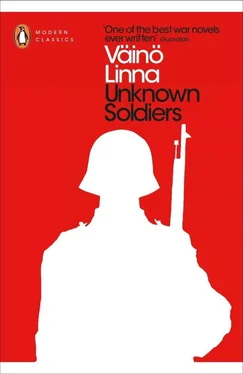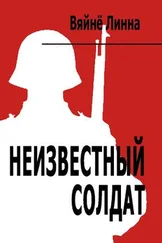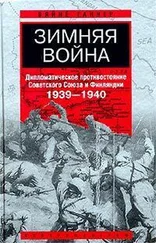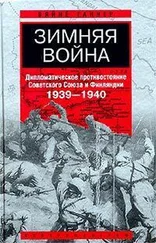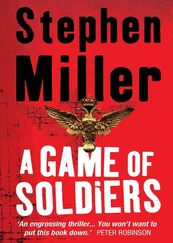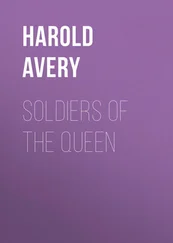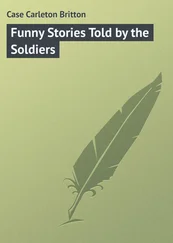The Master Sergeant stared at the floor and said, ‘So I should keep my family where they are.’
The Captain realized that Korsumäki hadn’t been following his train of thought in the least, but had been preoccupied with his own affairs the whole time. Age and the Winter War had stripped the Sergeant of all idealism – assuming he’d had any to begin with – and so, with a sigh, he thought of the suffering and hardship to come, which he had already known intimately once before. Kaarna could appreciate Korsumäki’s frame of mind, though it was utterly foreign to him personally. He hoped there would be a war. More than that, he hoped it would be a tough war. His career demanded it. He had had to leave the army some twenty years earlier, as a lieutenant, after having taken part in the controversial campaign in the Olonets. That, anybody could guess, was the reason he maintained a permanent state of war between himself and his superiors, even now. For his men he had not a mean word, but even the battalion commander was liable to be given hell. Kaarna was a difficult subordinate, no question – exceptionally talented and smart as a whip. He didn’t hide his light under a bushel either, but shone it ruthlessly upon any issue that provoked controversy. Despite his superior rank and position, even the Major had difficulty holding his own against the man who, on top of everything else, had enough medals to outweigh a two-pound sack of potatoes. He had been promoted to captain during the Winter War and commanded his own battalion. Then he’d remained in the service yet again when the war was over, but only as a company commander, demobilization having freed up too many majors and lieutenant colonels for the higher command positions. Even now, he still wasn’t going to get a battalion. Not even an infantry company! And what use were machine-gunners, least of all in an offensive attack? Well, death and duty would weed out the ranks, and his turn would come. His whole body itched for a chance to exercise its prowess. He had taken on death’s challenge enough times to know that he could face it down. It was as if the world war had reignited all his drive and ambition, making them flare up with new life. And he was patriotic, besides. He cultivated the sentiment actively because it fired him up with vigor and a desire for action.
Whole and powerful – that was him. His gaze betrayed none of the soul’s weaker points, vulnerabilities that might bring him to his knees.
The Master Sergeant called to the orderly to pour more coffee and the Captain resumed where they’d left off. ‘Yes, better leave your family where they are. We won’t be turning back. It’s not like last time. By the way, the supply vehicles will only meet up with the company once we reach our destination. They have to load them up first. And the supply train isn’t assigned just to the company, it’s arranged in conjunction with the whole battalion.’
Well, that’s a relief, the Master Sergeant thought. So we don’t have to worry about that. ‘But this smells a heck of a lot like war. Whole lot of hurry up and wait.’
The Captain laughed. ‘That’s it all right. It’ll be time to head out pretty soon. Say, whatever happened to supper? Or did they take the field kitchen in advance? Oh well, that’s their business.’
They drank their coffee in silence. The Master Sergeant was lost in thought, gazing out at the porch, where the company secretary was combing his hair. The man was making faces at himself in the mirror, adjusting its distance from his head as he pressed down on his wavy hair. The Master Sergeant sighed, as if to expel his rather melancholy state of mind, and said, ‘Takes all sorts.’
Kaarna gave a dry, cutting laugh and said, ‘The history of the world’s made up of all kinds of deeds. Some fellow in Berlin may be looking at a map of Russia and laying plans. This guy here, he’s combing his hair. But he comes along for the ride, too.’
The Captain set his cup on the table and, trying to cheer up the Sergeant, said confidently, ‘Well, we’re all in this together. All in for the long haul, wherever the devil it takes us. So it goes… Hmm… hmm… dum-dee-dum. Orderly! Fetch some razor blades from the canteen, will you? Get a bunch of packs. Pick up some bread rolls with the rest of the money – you can finish the coffee… Ah-ha. Moment I leave that damn phone, it rings… hmmm… hmm.’
V
The local branch of the Lotta Svärd, the women’s auxiliary, held a nightly canteen in one of the empty barracks. It was crammed with soldiers when the orderly arrived. The place sold coffee mixed with substitute, rock-hard bread rolls, tobacco, razors, envelopes and notepads. The notepads featured a stylized drawing of a soldier on the front. There he stood: helmeted, creases running down the front of his trousers, the blue cross of the Finnish flag billowing in the background. Some fantasy image or other. Just never, under any circumstances, reality. Reality was crowding around the canteen counter in a sort of mob, shouting, ‘Damn it! Don’t push in, you dickhead! Go to the back of the line!’
There was not a creased trouser-leg in sight. One guy had brown hand-me-downs from the charitable nation of England, somebody else had civilian trousers, somebody else, gray military slacks. The only articles of clothing they had been uniformly issued with were a cap, a light button-down shirt, and a belt.
There was just one Lotta behind the counter. The men were cracking jokes up and down the line – whatever jokes anybody happened to know, as they had to attract her attention somehow. Of course, they knew none of them stood much of a chance with Lieutenant Lammio sitting over at the end of the counter. But Rahikainen was one of those guys who refuse to recognize any opportunity as hopeless, on principle. He strutted up to the counter and said gallantly, ‘Now, what does the pretty girl have for Rahikainen today? Before we must part for ever! Ah, well. Cuppa coffee, of course. And a bread roll.’
‘Tonight we’re selling as many rolls as you want. We’re closing down the canteen.’
‘So that’s how it is. War’s comin’, huh? Signs of it in the air. Before we only got one per cup. What grave misfortune awaits us! I may never look into this little lady’s beautiful eyes again.’
The Lotta flushed with pleasure and glanced at Lammio, who was sitting at the end of the counter. Because it was for him – the radiance emanating from her. Even the flicker Rahikainen had sparked. Lammio was irritated at Rahikainen’s gallantry. First, for the general reason that he couldn’t stand the presence of another rooster on the roof, and second, because he had already arranged to profit by this particular Lotta’s presence in the barracks. Who knew when he’d see a woman again? And there wasn’t enough time to make it to the city. But if the convoy was slow enough coming, he could see this Lotta home and try his luck.
There was, of course, a clear division separating the Helsinki lieutenant from the North Karelian private, which was indeed so great that Lammio was not concerned, even if he knew Rahikainen to be a ladies’ man, and a successful one. Rahikainen was a tall, handsome fellow, well built, with a curly mop, a rich singing voice, and an everlasting motor-mouth that typically ran on empty. The last was Rahikainen’s primary vehicle for advancing his cause, but this time he hit a wall.
‘Finish your business so the others can have a chance, please.’ Lammio was suddenly very concerned on behalf of the other men in line, though he himself had dawdled for no less than twenty minutes making his own purchases. Rahikainen, however, was not the born-yesterday type. You couldn’t scare him with stripes and buttons, and Lammio’s power did not extend so far as to govern his canteen purchasing practices.
Читать дальше
